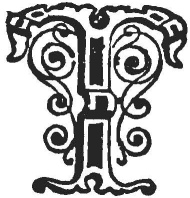
Traditions and Hearthside Stories of West Cornwall, Vol. 2, by William Bottrell, [1873], at sacred-texts.com
The Slighted Damsel of Gwinear.
Can match the fierce, th' unutterable pain
He feels who, day and night, devoid of rest,
Carries his own accuser in his breast.
Juvenal.
 |
Nearly a hundred years ago there lived in Gwinear Church-town a young man called Thomas Thomas, who for many years courted his cousin, Elizabeth Thomas, of the same place. She was much attached to the young man, who often promised to make her his wife; but, when she had shown her utmost trust in him, on some little disagreement, he slighted her and proposed to wed another damsel of the same village.
One Sunday afternoon he took his new love for a walk, passing by his old sweetheart's door, purposely to spite her.
Soon after they had passed the cot of Elizabeth's parents, the betrayed and wronged girl, who was of a very hasty temper, took a rope and a prayer book, went into a road-way field, and hanged herself near the path by which her faithless lover and his new fiance had passed, and would, probably, return.
They came home, however, by another road. On their arriving in Church-town, somebody asked them if they had seen Elizabeth, and remarked that no one knew where she had gone, as she had been sought in vain all over Church-town.
"Good God," exclaimed Thomas, "has she made away with herself? For more than once she vowed that she would if I slighted her."
Then, as if tokened by her spirit, he went, followed by others, direct to the tree on which they found her hanging and dead.
On the ground, at her feet, was her open prayer book. He took it up and found a leaf turned down at the "Cursing Psalm; "on a leaf too he read her name followed by "When this you see remember me."
Thomas then knew how she had doomed him; and he exclaimed "I'm ruined, I'm ruined, for ever and ever."
For a long while he wandered about like one distracted, working in various parts of the country, sometimes at mining, other times at husbandry, and never returned to Gwinear Church-town.
Little was seen of him, by anyone who knew him, until after some years, when he went to live in Market-jew. He would never venture to church or chapel for fear of hearing read the 109th Psalm; he dreaded even to pass near a school for the same reason.
He was several times hurt in the mines, in which he worked; and he attributed all his misfortunes and bad luck to the curse of Elizabeth, whose avenging ghost often appeared to him—as well by day as by night—with an open prayer book in her hand.
He could never sleep without a comrade in his room; and seldom even then, for, after a short slumber, when worn-out with fatigue, he would start up in bed, crying in agony, "Oh,
dear Betsy, shut the book. Do shut the book."
Notwithstanding the distraction of his mind, he was still a fine, strong, lusty, man, and many of his comrades advised him to get married, saying there was nothing like a living wife to drive away the spirit of a dead sweetheart. Taking their advice, he paid his addresses to several young women of the neighbourhood and others farther away; but they, one and all, flouted him with scorn, for the history of his unfortunate first love was blown far and near. If he persisted in his suit the indignant damsels would ask him with a sneer if he wished to bring all the ill-wishes of the "Cursing Psalm" on their heads, too.
At length, however, a widow in Market-jew took pity on Thomas and consented to venture her lot with him; and Betsy's ghost ceased persecuting him—for a bit.
But on the road to St. Hilary Church—whither Thomas and the widow proceeded to get married—the weather suddenly changed; from a calm and sunshine it became a tempest, with thunder and lightning; it was harvest time, and a cloud, black as night, hung over them, and rain poured along churchway-path, whilst they saw people binding barley in the fields on either hand.
Thomas, trembling with fear, saw his sweetheart's ghost, with her open book, standing menacingly in the path before him; and he would have turned back, had not the widow urged him on, saying that she saw no ghost, and didn't mind her nor yet her book; and got him married. He lived for a few years pretty tranquilly; and his wife bore him two children. Then he was again disturbed with visits from the avenging ghost; and some misfortune or sickness always closely followed its appearance; until Thomas—worn-out in body and mind—when less than forty years of age died, and was buried in St. Hilary.

